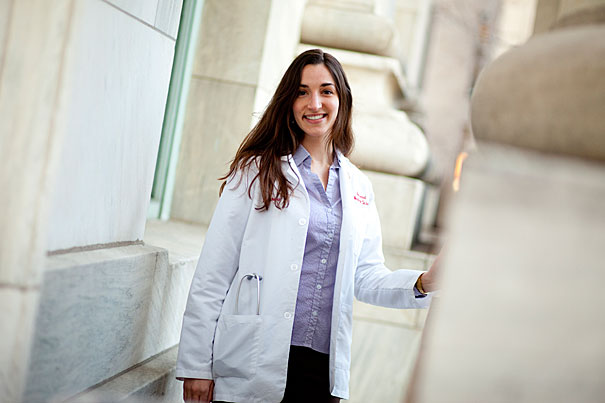
Harvard Medical School student Eva Mihalis went through two health crises at Harvard. With the help of adviser Beverly Woo, associate professor medicine, “I learned more facts than I can readily remember during my first year of medical school, but the lessons I learned from Dr. Woo stick with me. Through her example, I felt the difference that a caring doctor can make in a patient’s life. I began to learn what it means to be a good doctor.”
Rose Lincoln/Harvard Staff Photographer
Becoming a good doctor
Caring mentor helps a medical student learn to nurture
At the beginning of my first year at Harvard Medical School (HMS), my mother, who is a cancer survivor, called me, crying. She had a low white blood cell count and an X-ray with diffuse white marks. One of the medical assistants at her primary care physician’s office mentioned that this might mean that her cancer had returned and was metastatic. A sinking feeling of dread slid down my throat and into my stomach. What if my mother was deathly ill again?
At School, we had learned about hematocrit and red blood cells, but I knew nothing yet of white blood cells and cancer. I did not know where to look up the lab results or even how to understand them had I known where to look. I emailed my adviser, Dr. Beverly Woo. She immediately emailed me back with her phone number and stayed with me on the phone, consoling me, late into the night. She even connected my mother with an excellent physician, who helped to sort out the results. Fortunately, there was no cancer.
Dr. Woo is a leader in medical education. She introduces all first-year medical students to clinical interviewing in the revolutionary “Patient-Doctor I” course. She advises students on their course work.
However, her greatest leadership is through her mentorship. A mentor leads through example, collaborating with mentees instead of imposing on them. I learned more facts than I can readily remember during my first year of medical school, but the lessons I learned from Dr. Woo stick with me. Through her example, I felt the difference that a caring doctor can make in a patient’s life. I began to learn what it means to be a good doctor.
In April of my first year, I learned that I had a 5-centimeter hemorrhaging cyst in my right ovary. I was in constant pain. I could not sleep, concentrate on schoolwork, or, at times, even walk. I was worried once again, but this time I knew where to look. I researched the differential diagnosis, requested copies of all my results, and interpreted them with the help of the online medical library resources. I learned that infertility was a potential side effect and became more worried than ever.
I still did not have the tools to know how worried I should be. How did I fit into the risk profile? I knew just enough to get myself into more trouble. In the end, curled up in a hospital bed in the emergency room, I called Dr. Woo. She came to the hospital, spoke to my physicians, and helped me to get the information I needed.
No matter how many facts I learn, I’ll always depend upon the physicians who have gone before me to mentor me, advocate for me, and care for me when I am ill. I am lucky that there is an overabundance of mentors at Harvard, for through their leadership, I can learn to be a good doctor.
If you’re an undergraduate or graduate student and have an essay to share about life at Harvard, please email your ideas to Jim Concannon, the Gazette’s news editor, at Jim_Concannon@harvard.edu.




